- Home
- Karen Traviss
Hard Contact Page 11
Hard Contact Read online
Page 11
“You don’t think we’re going to make it, do you, Fi?”
“I’m not afraid to die. Not in combat, anyway.”
“I didn’t say you were.”
“It’s just …”
“Ten-meter range, son. No Kaminoans listening.”
“It’s just so inefficient. You said it yourself. You said it was a waste.”
“That was Geonosis.”
“They spend so much time and trouble making us perfect and then they don’t give us what we need to do the job. You remember what Sergeant Kal used to say?”
“He used to swear a lot, I remember that.”
“No, he used to get upset when he’d had a few drinks and say that he could make us better soldiers if we had time to go out and live. Data-rich, experience-poor. That’s what he used to say.”
“He used to slur the words quite a bit, too. And he didn’t like clones.”
“That was all bluster. And you know it.”
Yes, Kal Skirata said awful things about clones, but it never sounded as if he meant them, not to the clones, anyway. He got uj cake from home, no easy feat on secret, sealed Kamino, and shared it with the commando squads he was responsible for training. He called them his Dead Men, his Wet Droids, all kinds of abusive things. But if you caught him off duty in his cabin, he would sometimes fight back tears and make you eat some delicacy smuggled in for him, or encourage you to read one of his illicit texts that wasn’t on the accelerated training curriculum. They were often stories of soldiers who could have done many other things, but chose to fight. Sergeant Kal was especially eager for his Wet Droids to read stuff about a culture called Mandalorian. He admired Jango Fett. “This is who you really are,” he’d say. “Be proud, however much these ugly gray freaks treat you like cattle.”
No, he didn’t like Kaminoans much, did Kal Skirata.
Once he signed up with the Kaminoans, he said, they never let him go home again. But he’d told Niner that he didn’t want to. He couldn’t leave his boys now, not since he knew. “Brief,” he’d say, gesturing with a glass of colorless alcohol, “is never glorious.”
Niner was determined to work out what Kal Skirata had come to understand, and why it upset him so much.
“Nobody has all the answers,” Niner said. “The trouble with getting used to being powerful is that you can forget the small details that’ll bring you down.”
Fi made that ffff sound as if he was about to start laughing. “I know who you’re quoting.”
Niner didn’t even realize he’d said it. It was Sergeant Kal all right. He’d even started using the word son.
He missed him.
Then the comlink warning light in his HUD interrupted his thoughts. Medium range. What was Atin—
“Contact, five hundred meters, dead on your six.” Atin’s voice cut through. “Droids. Ten, one humanoid—confirm ten tinnies, one wet, looks like an officer.” There was a loud blast behind them. “Correction—hard contact.”
Niner knew this by rote and Fi didn’t even exchange words with him. They dropped the gear and darted back the way they had come, rifles up, safetys off, and when they got within fifty meters of Atin’s location they dropped into the prone position to aim.
Atin was pinned down at the foot of a tree. There was one droid slumped on its side with wisps of smoke rising from it, but the others were formed up, laying down covering fire while two advanced in short sprints, zigzagging. Atin was managing to get off the occasional shot. If they’d wanted him dead, they probably had the blaster power to do it.
They wanted Atin alive.
“I can see the wet,” Fi said. He was to Niner’s left, staring down the sniperscope. “Aqualish captain, in fact.”
“Okay. Take him when you’re ready.”
Niner snapped on his grenade launcher and aimed at the line of droids. They were spread, maybe forty meters end-to-end. It might take two rounds to knock them out if they didn’t scatter. Droids were great on battlefields. But they weren’t made for smart stuff, and if their officer was down …
Crack.
The air expanded instantly with the release of heat and energy. That was what gave plasma bolts their satisfying sound. The Aqualish fell backward, chest plate shattered, and lumps that looked like clods of wet soil but weren’t flew from him and dropped. The droids stopped for a fraction of a second, then carried on their course as if that was the best idea they had.
Fi scrambled away from his position and rolled.
No, they really weren’t good at close-quarters combat, at least not without direction from a wet. But there were always a lot of them, and they could return fire as well as any organic life-form. Three of the seven remaining droids turned their attention to the direction of Fi’s bolt.
The bushes where Fi had been firing exploded in flame. Niner perceived that it was all happening slowly—at heartbeat pace—but it wasn’t, not at all. He aimed and fired, once, twice. The twin explosions almost merged into one. Soil and grass and metal fragments rained down around him. At close range, droids were almost as dangerous when you hit them as when they hit you: they were their own shrapnel.
The firing stopped. Smoke drifted from at least five impact points. Niner could see nothing moving.
“One tinnie intact but immobile,” Fi said.
“Got it,” Niner said. He fired again, just in case.
“Looks sorted out there,” Fi said. He lowered his rifle. “Atin? You okay?”
“Nothing missing that I can’t bolt back on.”
“You’re a laugh a minute,” Niner said, and started to ease up on one arm. It was amazing how he could forget the weight of his pack for the few moments it took to save his life. “Now, how did they—”
“Down!” Atin yelled.
A bolt flew a meter above Niner’s head and he dropped back on his belly. It sounded like two shots. Then there was silence.
“Now it’s sorted,” Atin said. “Someone help me get up, please?”
When Niner managed to get into a kneeling position he could see a thoroughly shattered pile of droid, a bit closer to him than the line. It had been two shots he’d heard: one had been aimed at him and one had come from Atin, to make sure there wasn’t a second.
“Coming, brother,” Niner said.
Atin’s mud-smeared chest plate was a different color now, matte black with streaks radiating from the center. “I can’t breathe properly,” he said, utterly matter-of-fact, in the way badly injured men often were. He gulped in a breath. “My chest hurts.”
Fi propped him up against the trunk of a tree and took his helmet off. There was no blood coming from his mouth: he was bone white, and his raw scar looked dramatic, but he wasn’t bleeding out. His pupils looked okay: he wasn’t in shock. Fi released the gription on his chest plate and eased the armor off.
The bodysuit was intact.
“Sure it’s just your chest?” Fi asked. He didn’t have a tally scan to check Atin’s status. You didn’t start removing armor or embedded objects until you knew what you were dealing with. Sometimes that was all that was holding a man together. Atin nodded. Fi peeled away the section of suit starting at the collar.
“Phwoar,” Fi said. “That’s going to be a monster of a bruise.” There was a livid patch from his sternum to halfway down his chest. “You collecting distinguishing features or something?”
“Hit me square on,” Atin said, panting. “Not a regular round. Armor works though, eh?”
Fi took his helmet off and listened to Atin’s breathing with his ear pressed to his chest.
“Ow.”
“Shut up and breathe.”
Atin took shallow breaths, wincing. Fi straightened up and nodded. “Can’t hear any pneumothorax,” he said. “But let’s keep an eye on him. The air trapped inside can build up. Might be fractured ribs, might just be a bad bruise.” He took out a canister of bacta and sprayed the rapidly developing bruise. Atin lifted his arms slightly as if testing them.
Fi sea
led the bodysuit and armor back in place.
“I’ll take your pack,” Niner said, and unclipped it. It was the least he could do. “I think we can skip RV Beta now. Let’s leave some souvenirs around there so Darman can spot them if he shows up. You never know if more tinnies will follow. They’re not original thinkers.”
They probably had a few minutes, even if any of the droids had managed to call in to base. Fi sprinted off through the trees with a few pieces of debris to leave them at the RV point. Niner searched the remains of the Aqualish officer and took everything that looked like a key, a data medium, or proof of ID. Then he dragged Atin’s pack behind him on a webbing strap, heading for the place they’d left the entry equipment.
It was going to be a tough slog to RV Gamma, at least until Atin could carry his pack again.
The whole engagement had lasted five minutes and eight seconds, first shot to last, including running time. He had no idea if it had been one second or half an hour. Funny thing, time perception under fire. Niner’s boots crunched over droid shrapnel and he wondered how long a firefight felt to a droid.
“Is that how they see us?” Niner asked. “Ordinary people, that is. Like droids?”
“No,” Atin said. “We don’t have any scrap value.” He laughed and stopped short with a small gasp. It must have hurt him. “I’m going to slow you down.”
“Don’t go gallant on me. You’re coming the rest of the way because I’m not lugging all that gear around with Fi. I want a break sometime.”
“Okay.”
“And thanks. I owe you.”
“No. You don’t.”
“Thanks anyway. Want to explain why you’ve been Darman?”
Atin was holding his rifle carefully, a handspan clear of his chest. “I’ve been the last man left standing in two squads now.”
“Oh.” Silence. Niner prompted: “Want to tell me how?”
“First squad tried to rescue me on a live range exercise. I didn’t need rescuing. Not that badly, anyway.”
“Ah.” Niner felt instantly appalled at himself for thinking Atin didn’t care what happened to Darman. He was just caring too much. “My training sergeant said there was something called survivor’s guilt. He also said that in those cases, having you survive was what your squad wanted.”
“They bred a lot of stuff out of us. Why not that as well?”
Niner stopped dragging Atin’s pack and slung his rifle over his shoulder. He lifted the pack and was glad to carry it.
“If they had, I might not be here now,” he said, and knew Darman would be waiting for them tomorrow.
Ghez Hokan surveyed the scrap heap that had been a functioning droid platoon a few hours earlier. Whatever had hit them had hit fast and hard. And—judging by the precisely placed sniper shot and the blast pattern of only two grenades—they had been taken out by experts.
It might have been one man or it might have been a platoon. You typically couldn’t ambush battle droids like that with a handful of men, but that depended entirely on who the men were. It was a shame the captain hadn’t called back with a sitrep as instructed: if he hadn’t been killed, Hokan would have had him shot for disobeying operational procedure. He studied the droid escort lined up neatly by the speeder bikes and wondered if they felt anything when they saw dismantled comrades.
“There’s no sign of a camp, sir.” Lieutenant Cuvin came jogging back from the woods opposite the clearing. It was curious to see the Umbaran’s deathly pallor tinged pink by the exertion. “Some broken branches at knee height and crushed grass from troops firing prone, but I honestly can’t tell how many men we’re dealing with.”
“You can’t tell much, can you, Lieutenant?” Hokan said.
“Sir, I’ll check again.” He was white-faced now, white even for an Umbaran.
“Sir! Sir!” Second Lieutenant Hurati was enthusiastic, no doubt keen to be elevated to Cuvin’s rank. He sprinted to his commander, an attitude Hokan appreciated. “I’ve found the most extraordinary thing.”
“I’m glad one of you has found something. What is it?”
“A pile of droid parts, sir.”
“And this is extraordinary because …?”
“No, sir, they’re some way from here and they’re sort of arranged, sir.”
Hokan strode off for the speeder. “Show me.”
The trees had been cut down a few days earlier because there was already klol fungus growing on them in a pale-pink mesh. One broad stump—the flattest one, almost like an altar—supported the remains of a droid.
The torn pieces of its trunk were laid flat. The arms were neatly arranged on one side of the thorax and the legs on the other. Part of the faceplate was propped up as if looking skyward.
“That’s how the droid pilot was left, too, sir.” Hurati was a good man. He’d obviously studied the report the militia had filed, however appallingly inadequate its presentation had been. “I think it’s a sign.”
It was a long way to move a dead droid from a battle. There were no drag marks leading to the stump. It was a heavy load to carry on foot; they might even have a transport, although he could see no signs that a repulsorlift had passed over the ground. Hokan stared at the ritually arranged debris and tried to think who would want to send the Separatists a message—and what it might mean.
“It’s a trophy,” Hokan said. “They’re taunting us. They’re showing how easy this is for them.”
That made him angry. He was Mandalorian. Being an easy enemy wasn’t his way. “A curfew, Hurati. Declare a permanent curfew on all powered vehicles until further notice. Anything moving under power is either ours or the enemy. We can track all friendly transports.” He paused. “You have made sure all our vehicles have their own transponders, haven’t you?”
“Yes sir.”
“Why the delay, then?”
“It’s—it’s harvest, sir. How will the farmers get their produce to Teklet for shipping?”
“I imagine they have handcarts,” Hokan said. He swung his leg over the speeder’s saddle. “Ankkit will have to find an alternative means of conveyance for his crops.”
Hokan pondered on the carefully arranged droid debris all the way back to his new headquarters in Ankkit’s villa. He feared that moving into that vulgar Hutt bordello of a house would make him soft and decadent, too, so he set up his office in an outbuilding. He didn’t care for fancy drapery and useless ornaments. It just happened to be convenient for the research facility, and close to his troops.
So who had the Republic sent to target Uthan’s project? They were clearly bold men; first they made sport of an aerial patrol, now a droid platoon and its captain. They seemed to be choosing their targets casually. The clone army must have been terribly important to the Republic’s strategy for these troops to land like this. Where were the conventional armies? Where were the Jedi generals? When would they come?
This was a new kind of war. He could feel it.
He hated not knowing who was out there, preparing to fight him. If he hadn’t known the man was dead, he would have sworn it was Jango Fett himself.
8
You know what makes you especially effective? It’s not just that you’re genetically superior and intensively trained. And it’s not just because you obey orders without question. It’s because you’re all prepared to shoot to kill, every time. Only one percent of civilians are prepared to kill, and less than a quarter of ordinary human soldiers, even under fire.
—Sergeant Kal Skirata, from his opening lecture to commandos on military psychology
The droid fired a volley of bolts at the sealed alloy doors until they glowed red. And still nothing happened.
“Stop!”
The droid appeared not to hear.
Dr. Ovolot Qail Uthan ran down the flight of steps, red and black strands of hair streaming out behind her. She was wearing a voluminous dark blue nightgown; it looked as expensive as her day wear. Hokan saluted her politely and went on watching the droid’s progress.
“Have you gone mad?” Uthan whispered fiercely. She didn’t strike Hokan as the sort of woman who would need to raise her voice to make her point. “There’s a biohazard behind that door.”
“I know,” Hokan said. “Just testing. It’s all holding up well indeed. Excellent safety bulkheads.”
Uthan took a discreet but deep breath and glanced briefly at the backs of her hands. “This facility has been built and tested to the highest containment standards, Major. You needn’t worry.”
“But I do, Doctor.” He watched the droid patiently wasting bolt after bolt on the door for a while. It paused to swap power packs. “Stop.”
It stopped. Hokan took out the lightsaber he had taken from Kast Fulier and ran its pure blue light down the seam between the two doors. Smoke curled up from the surface, but no breach appeared. It would take even a Jedi a long time to cut through this plating.
“Forgive my insistence, but could this not wait until the morning?” Uthan asked. “I’m working around the chrono as it is to weaponize this agent. I even sleep here. I would prefer to be doing that right now.”
“My apologies, Doctor, but we might not have the luxury of time.”
“What’s time got to do with it?”
“I think I need to relocate you.”
Uthan had a way of lowering her head slightly, then straightening up as if she were a krayt dragon. It was most impressive. “This is a high-risk biohazard facility. It can’t be relocated like some tent.”
“I appreciate the inconvenience involved. I still believe it would be safer if you were to pack up your materials and staff and move elsewhere.”
“Why? You have the security situation under control.”
“I have it more under control than I did, that’s true, but enemy troops have landed. I don’t know their numbers, and I don’t know what matériel and armaments they have at their disposal. All I know—all I think I know—is that this is what they’ve come for.”
“This is a fortress. You have a hundred droids at your disposal. Let them come. You can repel them.”

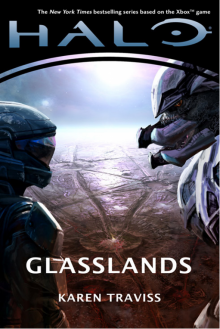 Halo: Glasslands
Halo: Glasslands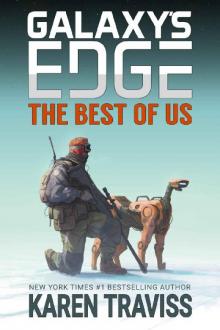 The Best of Us
The Best of Us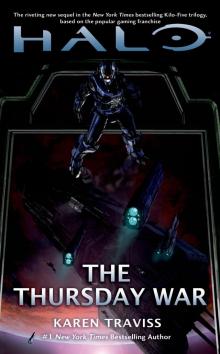 Halo: The Thursday War
Halo: The Thursday War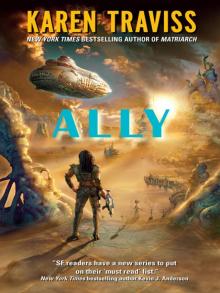 Ally
Ally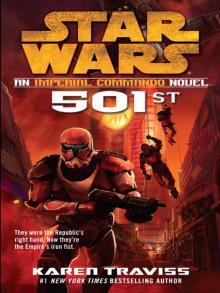 501st: An Imperial Commando Novel
501st: An Imperial Commando Novel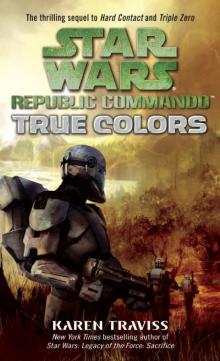 True Colors
True Colors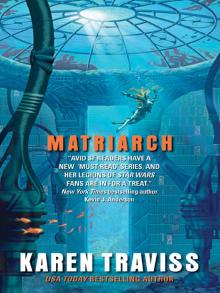 Matriarch
Matriarch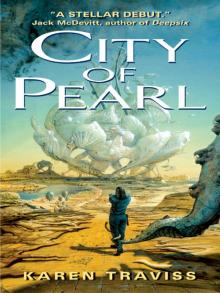 City of Pearl
City of Pearl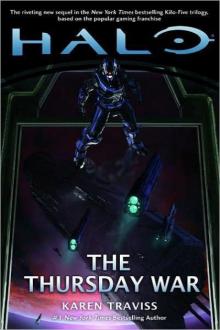 The Thursday War
The Thursday War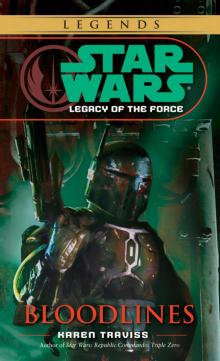 Bloodlines
Bloodlines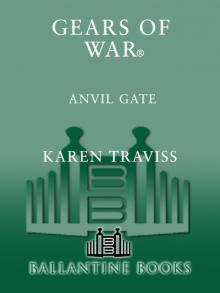 Gears of War: Anvil Gate
Gears of War: Anvil Gate Crossing the Line
Crossing the Line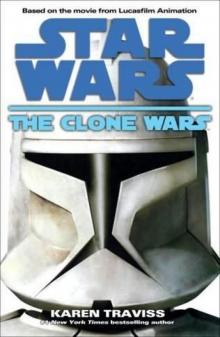 Star Wars - The Clone Wars 01
Star Wars - The Clone Wars 01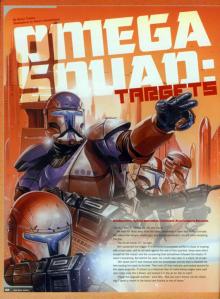 Omega Squad: Targets
Omega Squad: Targets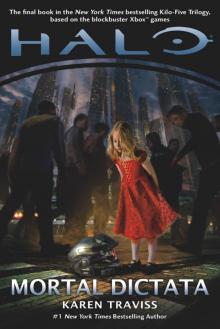 Halo®: Mortal Dictata
Halo®: Mortal Dictata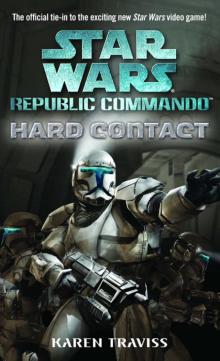 Hard Contact
Hard Contact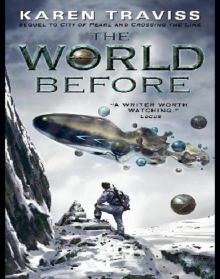 The World Before
The World Before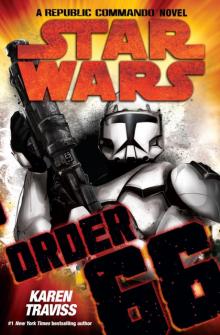 Order 66
Order 66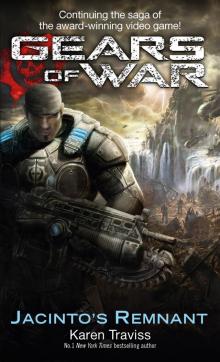 Gears of War: Jacinto's Remnant
Gears of War: Jacinto's Remnant Sacrifice
Sacrifice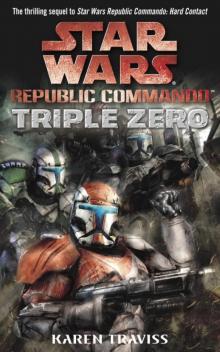 Triple Zero
Triple Zero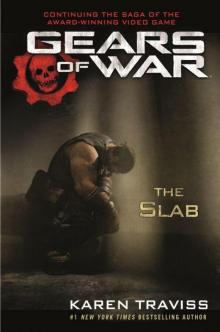 Gears of War: The Slab (Gears of War 5)
Gears of War: The Slab (Gears of War 5)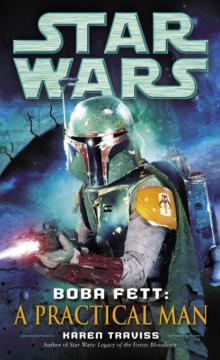 NEW JEDI ORDER: BOBA FETT: A PRACTICAL MAN
NEW JEDI ORDER: BOBA FETT: A PRACTICAL MAN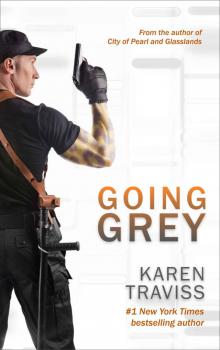 Going Grey
Going Grey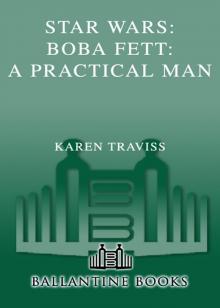 Star Wars: Boba Fett: A Practical Man
Star Wars: Boba Fett: A Practical Man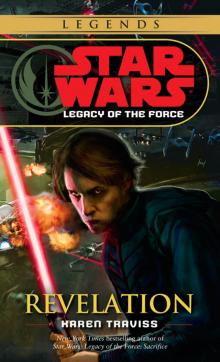 Revelation
Revelation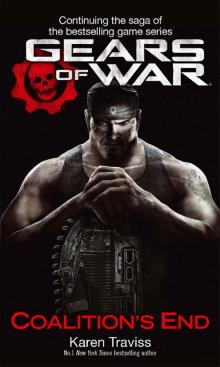 Coalition's End
Coalition's End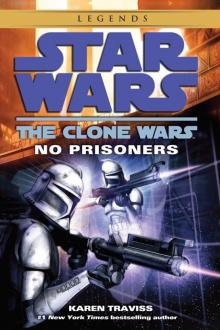 No Prisoners
No Prisoners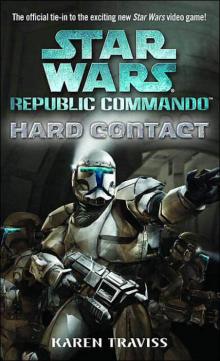 Star Wars Republic Commando: Hard Contact
Star Wars Republic Commando: Hard Contact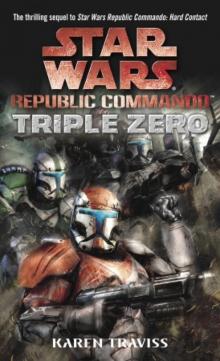 Star Wars: Republic Commando: Triple Zero rc-3
Star Wars: Republic Commando: Triple Zero rc-3 The Clone Wars
The Clone Wars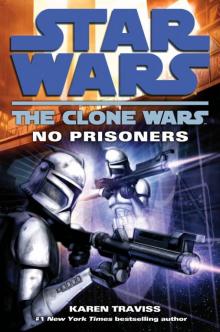 The Clone Wars: No Prisoners
The Clone Wars: No Prisoners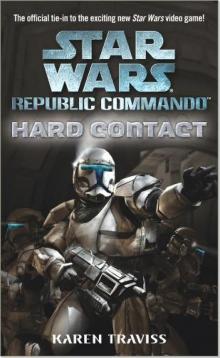 Star Wars: Republic Commando: Hard Contact rc-1
Star Wars: Republic Commando: Hard Contact rc-1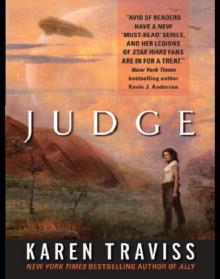 Judge
Judge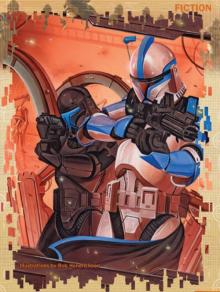 Omega Squad: Targets rc-4
Omega Squad: Targets rc-4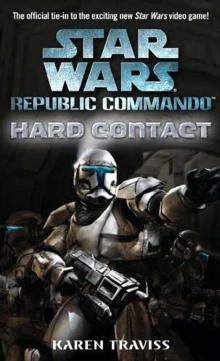 Star Wars - Republic Commando - Hard Contact
Star Wars - Republic Commando - Hard Contact